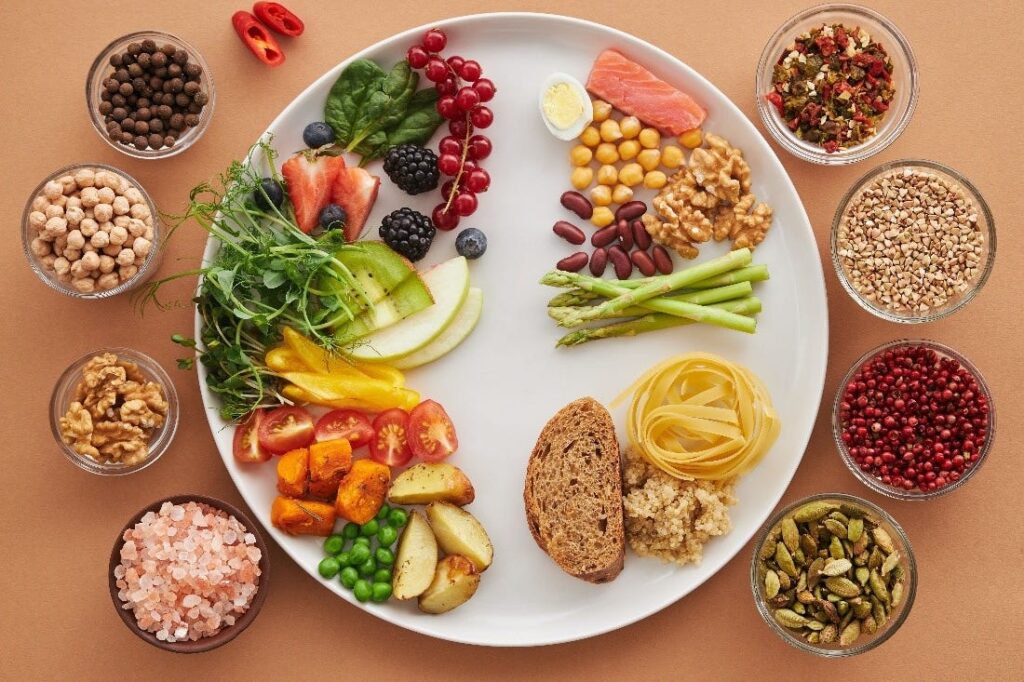Introduction
A plant-based diet has become a popular lifestyle choice, with many people adopting it for health, environmental, or ethical reasons. This way of eating emphasizes whole, minimally processed plant foods while limiting or eliminating animal products. Research suggests that plant-based diets not only improve overall health but also contribute to sustainable living.
In this article, we’ll explore the numerous benefits of a plant-based diet, common challenges, and tips to help you successfully transition to this lifestyle.
Table of Contents
- Introduction
- What Is a Plant-Based Diet?
- Types of Plant-Based Diets
- Key Benefits of a Plant-Based Diet
- 4.1. Improved Heart Health
- 4.2. Supports Weight Loss and Maintenance
- 4.3. Reduces Risk of Chronic Diseases
- 4.4. Boosts Digestive Health
- 4.5. Better Mental Well-Being
- 4.6. Environmental Sustainability
- Potential Nutritional Challenges and How to Overcome Them
- Foods to Include in a Plant-Based Diet
- Tips for Transitioning to a Plant-Based Diet
- Conclusion
2. What Is a Plant-Based Diet?
A plant-based diet focuses primarily on foods derived from plants, including vegetables, fruits, grains, legumes, nuts, and seeds. While some plant-based eaters choose to avoid animal products entirely (as in veganism), others may still consume small amounts of meat, dairy, or eggs on occasion.
This diet encourages whole foods over highly processed products, aiming for optimal nutrition and long-term health benefits.
3. Types of Plant-Based Diets
There are several variations of plant-based diets, depending on individual preferences:
- Vegan: Excludes all animal products, including dairy and eggs.
- Vegetarian: Excludes meat and fish but may include dairy and eggs.
- Flexitarian: Primarily plant-based with occasional consumption of meat or fish.
- Whole-Food, Plant-Based (WFPB): Focuses on unprocessed plant foods, avoiding refined sugars and oils.
4. Key Benefits of a Plant-Based Diet
4.1. Improved Heart Health
Research shows that diets rich in fruits, vegetables, whole grains, and nuts can significantly reduce the risk of heart disease by lowering cholesterol levels and blood pressure . The abundance of fiber, antioxidants, and healthy fats in plant foods helps protect against cardiovascular problems.
4.2. Supports Weight Loss and Maintenance
A plant-based diet is often lower in calories and higher in fiber, helping people feel fuller for longer. This makes it easier to manage weight without resorting to restrictive calorie counting . Studies have found that individuals following plant-based diets tend to have a lower body mass index (BMI) compared to those who consume animal products.
4.3. Reduces Risk of Chronic Diseases
Plant-based diets have been linked to a lower risk of chronic diseases, including type 2 diabetes, hypertension, and certain cancers. The anti-inflammatory properties of fruits, vegetables, and nuts may help reduce disease-related inflammation in the body .
4.4. Boosts Digestive Health
Plant foods are rich in dietary fiber, which promotes healthy digestion and prevents issues like constipation. Fiber also supports the growth of beneficial gut bacteria, contributing to a balanced microbiome and better nutrient absorption.
4.5. Better Mental Well-Being
Research suggests that eating a variety of plant-based foods can improve mental health by reducing symptoms of depression and anxiety . The high levels of antioxidants, vitamins, and minerals in plant foods help protect brain function and enhance mood.
4.6. Environmental Sustainability
Adopting a plant-based diet benefits the planet by reducing greenhouse gas emissions and conserving water and land resources. Studies show that plant-based diets require fewer natural resources than animal-based diets, making them more sustainable for the environment .
5. Potential Nutritional Challenges and How to Overcome Them
While a plant-based diet offers numerous health benefits, some nutrients may require special attention:
- Protein: Include beans, lentils, tofu, quinoa, and chia seeds to meet protein needs.
- Vitamin B12: Consider fortified foods or supplements, as B12 is mainly found in animal products.
- Iron: Eat iron-rich plant foods (e.g., spinach, lentils) along with vitamin C to enhance absorption.
- Omega-3 Fatty Acids: Add flaxseeds, chia seeds, and walnuts to your diet.
- Calcium: Opt for fortified plant milks and leafy greens.
6. Foods to Include in a Plant-Based Diet
Here’s a list of nutrient-dense foods to prioritize:
- Vegetables: Kale, broccoli, carrots, spinach
- Fruits: Berries, apples, bananas, citrus fruits
- Whole Grains: Oats, quinoa, brown rice, whole wheat
- Legumes: Lentils, chickpeas, black beans
- Nuts and Seeds: Almonds, chia seeds, flaxseeds
- Plant-Based Proteins: Tofu, tempeh, seitan
7. Tips for Transitioning to a Plant-Based Diet
Transitioning to a plant-based lifestyle can be smooth with these tips:
- Start Slowly: Begin by replacing one or two meals a day with plant-based options.
- Plan Your Meals: Use a meal planner to avoid last-minute unhealthy choices.
- Experiment with New Recipes: Try new ingredients and cooking techniques to keep things exciting.
- Eat a Variety of Foods: Ensure you’re getting a balanced intake of essential nutrients.
- Find Plant-Based Alternatives: Swap dairy products for almond or soy milk and try meat substitutes.
- Stay Informed: Join online communities or follow plant-based blogs for inspiration.
8. Conclusion
The benefits of a plant-based diet extend beyond personal health to the well-being of the planet. From improving heart health to reducing the risk of chronic diseases, this lifestyle choice offers a sustainable way to enhance overall wellness.
While it may require some effort to ensure proper nutrition, the long-term rewards are worth it. Whether you’re looking to lose weight, improve your mental health, or contribute to environmental conservation, a plant-based diet is a step in the right direction.
Adopting this lifestyle doesn’t have to be all or nothing—small changes can make a big difference. Start incorporating more plant-based meals into your routine, and over time, you’ll experience the transformative power of whole, plant-based foods.

[…] High in Omega-3 Fatty Acids Benefits of a Plant-Based Diet October 13, […]